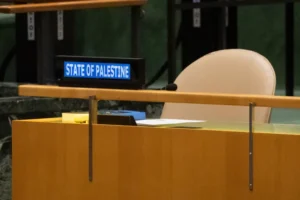‘Missing in action’: Where has Palestinian Authority been since October 7?

A seat for the Palestinian Representative to the UN is seen during the 79th session of the United Nations General Assembly, 10 September 2024
Alice Speri writes in Al Jazeera on 16 October 2024:
Palestinian Authority (PA) President Mahmoud Abbas was in his element when, on stage at the UN General Assembly (UNGA) last month, he thanked 124 countries for voting yes on the first-ever resolution introduced by Palestine at the UNGA.
He was back at the scene of one of the PA’s most significant political achievements since its establishment under the Oslo Accords in the mid-1990s – Palestine’s successful 2012 bid for non-member observer status.
Abbas, an architect of the peace process that created the PA as a government-in-waiting until the establishment of a Palestinian state, succeeded Yasser Arafat at the helm of the PA after his death. Since then, the PA has made international recognition and diplomacy a priority, with constant calls for UN action and a years-long campaign for the International Criminal Court to investigate crimes committed in Palestine.
At the UNGA, Abbas condemned Israel’s yearlong war on Gaza, ongoing incursions and settlement expansion in the occupied West Bank. But for many Palestinians, who are reeling from the deadliest year in a long history of violence, Abbas’s words at the UN felt tired and irrelevant.
While the Palestinian Authority “paid lip service” to the tragedy Palestinians were facing, it also continued to carry out its role as “subcontractor” for the Israeli occupation by suppressing protests and resistance in the West Bank, Yara Hawari, a co-director of the Palestinian think tank Al Shabaka, told Al Jazeera.
“Really since the beginning of the genocide in Gaza, the Palestinian Authority has been absent from the scene, making a few comments here or there, or statements that really do nothing”, she said. “But there have been no concrete actions to support Palestinians in Gaza”.
Sam Bahour, a Palestinian American businessman based in the West Bank, agreed, telling Al Jazeera that most Palestinians feel the Palestinian Authority, and Palestinian political leadership more broadly, have been largely “missing in action”. “October 7 did not change the Palestinian leadership’s mode of operation; it merely intensified it”, he added. “Their mode was, and remains to be absent – absent on the ground in Palestine, absent politically, and absent from Palestinian daily life”.
“Where they are present is in the halls of the international venues, which has a constructive role, but one, as the past year taught everyone, that is not enough to end this Israeli-made nightmare of decades”.
Faded into the background
For years before October 7, the Palestinian Authority has seen its legitimacy tumble among Palestinians in both the West Bank and Gaza as it failed to protect them from escalating military and settler violence.
